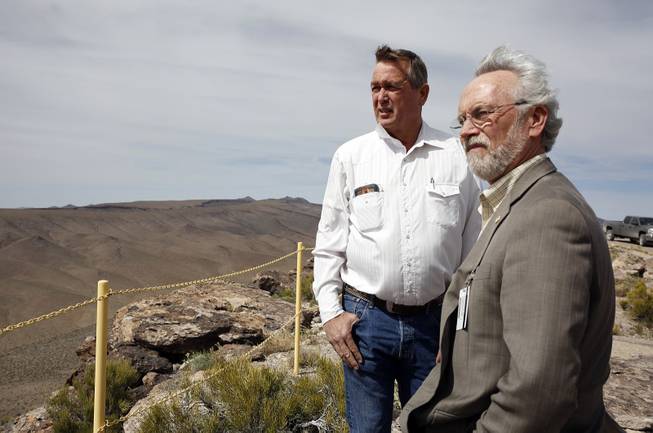
AP Photo/John Locher
Rep. Cresent Hardy, R-Nev., left, and Rep. Dan Newhouse, R-Wash., stand on the crest of Yucca Mountain during a congressional tour Thursday, April 9, 2015, near Mercury, Nev. Several members of congress toured the proposed radioactive wast dump 90 miles northwest of Las Vegas. (AP Photo/John Locher)
Wednesday, May 20, 2015 | 2 a.m.
View more of the Sun's opinion section
View more of the Sun's opinion section
Almost as soon as 4th District U.S. Rep. Cresent Hardy (R-Nev.) learned that the White House was considering a new national monument in Nevada, he put out a news release condemning it. According to his release, Hardy objects due to his belief (baseless as it is) that the monument designation will somehow interfere with military training associated with the nearby Nevada Test and Training Range.
The draft presidential proclamation to create the new Basin and Range National Monument, which the congressman cites, explicitly says the designation shall not preclude low-level overflights of military aircraft, the designation of special-use airspace, or the establishment of military training routes.
That language is virtually identical to language in the Tule Springs Fossil Beds National Monument, which Hardy holds up as a “great example” of protecting military interests.
There is a long history in this country of national monuments coexisting with military training operations. White Sands National Monument in New Mexico has a 70-year history of helping facilitate military training, and sections of the monument are periodically closed for missile testing from nearby White Sands Missile Range.
Hardy’s conjecture about monument designation interfering with military training is so unhinged from actual evidence it is hard to imagine he actually believes it.
Instead of hastily grasping for an excuse to oppose designation — most likely a reaction to who is proposing it — the congressman’s constituents would be better served by him taking a serious and honest look at the merits of such a designation.
A recent newspaper article characterized having a new national monument within a short drive of the Las Vegas Strip as “beyond tourism officials’ wildest dreams.” The area being considered represents a spectacular natural environment that deserves more public attention and visitation. A monument designation would generate that attention and give visitors to Las Vegas additional reasons to extend their stay.
Perhaps that is why this proposed monument designation enjoys widespread support, even from officials at Barrick Gold Corp., the world’s largest gold-mining company.
The lands under consideration, which include the Gold Butte and Garden Valley areas north of Las Vegas, are already publicly owned and exemplify the unique landscape, geology and wildlife of Nevada’s basin and range country. Their ecological and cultural values alone justify protection.
Even though some of today’s Republicans — those who either skate too close to Cliven Bundy radicalism or cater to the self-serving agenda of Koch Industries and its surrogates — oppose public land protection, land conservation in the United States is a Republican idea.
It was Abraham Lincoln who first protected California’s Yosemite Valley and Ulysses S. Grant, along with a Republican Congress, established Yellowstone National Park.
National monument designation is also a Republican invention. The Antiquities Act, which provides the authority for creating national monuments, was introduced in Congress by a Republican, passed by a Republican Congress and signed into law June 11, 1906, by another Republican, President Theodore Roosevelt.
This Republican tendency to safeguard our natural heritage is not limited to those who lived more than a century ago. Ronald Reagan signed more wilderness bills into law than any other president.
Reagan summed it up nicely when he rhetorically asked, “What is a conservative after all, but one who conserves. ...” He went on to say, “... we want to protect and conserve the land on which we live — our countryside, our rivers and mountains, our plains and meadows and forests. This is our patrimony. This is what we leave to our children. And our great moral responsibility is to leave it to them either as we found it or better than we found it.”
In his news release Hardy states that he is not opposed national monuments or preserves. He would like constituents to believe that he, too, has a strong conservation ethic. Taking a fresh look at the merits of a Basin and Range National Monument would be a good way to prove it.
Genuine conservatism has never supported a live-for-today shortsighted approach to decision-making, but rather one based on prudence and foresight. Staying true to that Republican conservation ethic and safeguarding these special lands will be the gift that keeps on giving, whereas exploiting them for the short-term gain of a few special interests will leave Nevada, and our nation, poorer in the end.
David Jenkins is president of Conservatives for Responsible Stewardship.

Join the Discussion:
Check this out for a full explanation of our conversion to the LiveFyre commenting system and instructions on how to sign up for an account.
Full comments policy